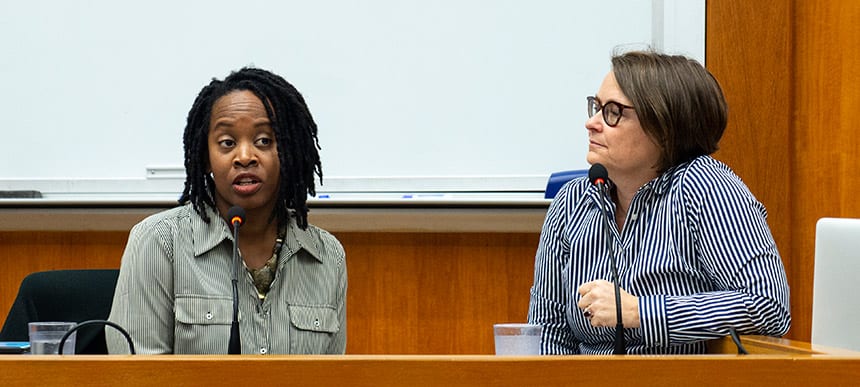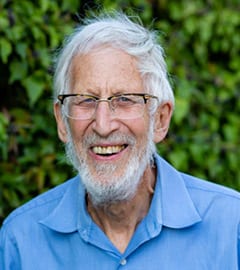
By Andrew Cohen
There are four times as many empty homes in Oakland as there are homeless people. In November, two women walked through the unlocked door of one of them and began living there—igniting a national call for housing rights.
Six formerly homeless women, now known as Moms 4 Housing, eventually occupied the three-bedroom house. As Wedgewood Properties (which bought the house in August 2019 and planned to flip it) pursued legal action, the women garnered support from national leaders and local residents who provided security and supplies. The movement gained steam as the mothers described the Bay Area’s housing affordability crisis and the rising barriers to securing shelter.

During a recent presentation at Berkeley Law before a packed lecture hall, two leaders of this effort—Carroll Fife and Leah Simon-Weisberg—described the rewards and challenges involved. The event was moderated by Osha Neumann, a lawyer with the East Bay Community Law Center, whose work includes protecting the civil rights of homeless people. Berkeley Law’s chapter of the National Lawyers’ Guild organized the event, and sponsor and partner groups included the school’s Women of Color Collective, Law Students of African Descent, Queers United in Revolutionary Subversion, La Raza Workers’ and Tenants’ Rights Clinic, Women of Berkeley Law, and the Berkeley Journal of Gender, Law & Justice.
“We have to stop thinking of housing as a way to make money,” said Simon-Weisberg, directing attorney of the Shelter Client Advocates Program at Eviction Defense Collaborative, Inc. “Housing is a human right. The housing crisis can be easily fixed, we just haven’t had the political will. But we’re getting there.”
In January, a court ruled that the mothers were illegal tenants and ordered their removal. Four days later, armed officers from the Alameda County Sheriff’s Office stormed into the home and evicted them. With the attention the situation generated, however, Wedgewood is working to have Oakland’s Community Land Trust trust buy the property, which would let the mothers stay there.
“We wanted to make this bigger than just the mothers occupying the space,” said Fife, regional director of the Alliance of Californians for Community Empowerment. “We talked about policies we’d like to pass and doing outreach in the encampments to get people who were able-bodied enough civically engaged. There was a lot of planning, organizing, and media outreach.”
A call for ‘movement lawyering’
Simon-Weisberg was a key figure throughout the legal battle over the Moms 4 Housing effort, including their eviction. She described the growth and importance of “movement lawyering,” agreeing with Neumann’s assertion that while occupying the home was illegal, “so much of the struggle for human rights always is.”
A community organizer in Oakland for more than 20 years, Fife had worked to assist each of the women in different capacities long before they entered the home.
“Individually, over the course of six months, they reached out to me not knowing the others did,” Fife said. “They said, ‘We can’t can’t take this anymore. We’re homeless, our children are suffering, and there’s no affordable housing available.’ Another unsheltered senior attempted suicide because she was at her wits’ end about being chronically homeless. At that point, I said let me bring everyone together about what they want to do.”
Fife noted that “these aren’t welfare queens sitting around all day. They have jobs, they go to school, they have children, they’re doing a myriad of things. The home was open, they didn’t pick the locks … The wage needed to afford a two-bedroom apartment in Alameda County these days is $40 an hour. When you put people together who have no other options, magic happens.”
Oakland’s homeless population reportedly grew 47 percent between 2017 and 2019 while housing costs have escalated, and 70 percent of that population is African American.
“What does that mean for the next generation, now growing up without housing and facing intense trauma?” Fife said. “Having shelter is one of the greatest indicators for human health.”
Alumni at the forefront
Fife and Simon-Weisberg have worked closely with Berkeley Law graduate Dan Siegel ’70 and other lawyers from his firm, Siegel and Yee in Oakland, on the legal matters involved.
“Dan Siegel’s firm has been a pillar of social justice movements in the Bay Area,” Fife said. “His goal as lawyer is to keep activists and organizers out of jail so they can lead these movements. He helps expose how the law protects the status quo.”
Simon-Weisberg also hailed the work of another alum, Madeline Howard ’07 (senior staff attorney at the Western Center on Law & Poverty). Howard was instrumental in pushing forward a recent California bill that allows tenants to claim a right of possession—which stops an eviction until a hearing occurs—if a landlord tries to evict after foreclosure.
Fife said that through media outreach, policy efforts, and litigation, housing advocates will continue to “develop the narrative that housing is a right while buildings are empty and people are living on the street. When you can see boarded-up buildings and people in encampments, that (juxtaposition) is inescapable.”
Toward that end, her organization is promoting Assembly Bill 2563, which would give tenants a first right of refusal any time landlords put their property on the market. In other words, if such properties are left empty and put up for sale, Oakland’s Community Land Trust can buy it for residential use.
For Simon-Weisberg, it comes down to using her training for good. “As lawyers, we’re there to help make the movement possible,” she said.